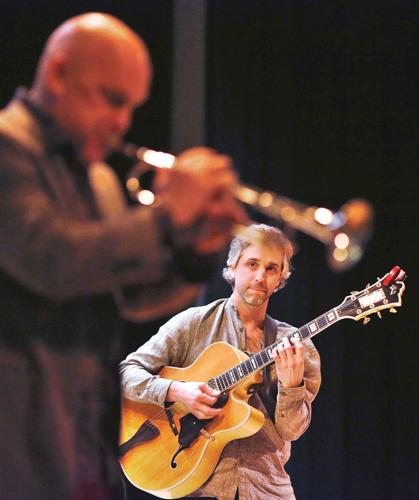Do all of these jazz festivals make you wish you were tapping your toes in some dimly lit backroom to the sweet sounds of a jamming piano player? For those who are feeling the call of the saxophone, but might be feeling a tad unprepared to tackle a jazz concert, we asked Kris Allen, the Lyell B. Clay Artist in Residence in jazz activities/lecturer in music and director of the Jazz Ensemble at Williams College for three things novice jazz lovers should know about the music genre.
1 "Jazz" is a little hard to define
The term jazz has been around for over a century by now. It's earliest known use in print was in an article about minor league baseball and had nothing to do with music.
Having been applied to so many very different sounding styles of music over the years, "jazz," as a term, has become a very big tent of a genre designation. One could point to several characteristics that are usually present in jazz (improvisation, blues tonality, swing feeling), but there are countless exceptions to these rules. A quick search through a record store "jazz" bin, or an online streaming service, or a festival program, would likely reveal a range of music that might seem on face value wildly different, even while sharing some common DNA. Try something new and don't feel pressured to have an all-or-nothing love or hate of everything bearing the name "jazz."
2 Jazz has a unique history
Speaking of DNA, jazz music has a rich and important history. For many of jazz's most ardent lovers, the pleasure of jazz is deepened through an awareness of what has come before, heightening an appreciation for new innovations of today. Jazz is often heralded as "America's Classical Music" and (potential problems with that term aside) it is clearly one of our country's greatest cultural contributions to wider human history. It is a clearly African-American innovation, a synthesis of African and European elements that could not have happened anywhere else. Jazz has at various times been considered folk music, pop music and art music, and usually all at the same time. Jazz is also a vital part of the evolutionary tree of nearly every other American musical form that has come about in the past century. It's not a stretch to say that without Louis Armstrong, there would be no Beatles, and no Beyonce!
3 Jazz is not that different
One of the downsides to having a slippery definition, and a long and celebrated history, is that jazz can come across to the uninitiated as intimidating. Many people come under that impression that in order to appreciate jazz, a person must be a music student, or even a jazz professor. Although I would be the first to affirm the depth and complexity of jazz music, both now and across jazz history, I think that to approach the music from a purely academic angle is a missing of the point. When I think about the musicians or specific recordings that most move and captivate me, (trumpeter Lee Morgan, for one, that springs to mind at the moment) it occurs to me that the elemental "basics" of the music is what makes it emotionally powerful and rewarding. A musician (or musicians) with a captivating and personal tone, control of time, a sense of musical narrative "storytelling" and ensemble groove and communication makes for beautiful jazz, just as it makes for great rock, rap, country or classical music.
For more information about Kris Allen and the Williams College Music Department, visit www.krisallenjazz.com, www.music.williams.edu.



